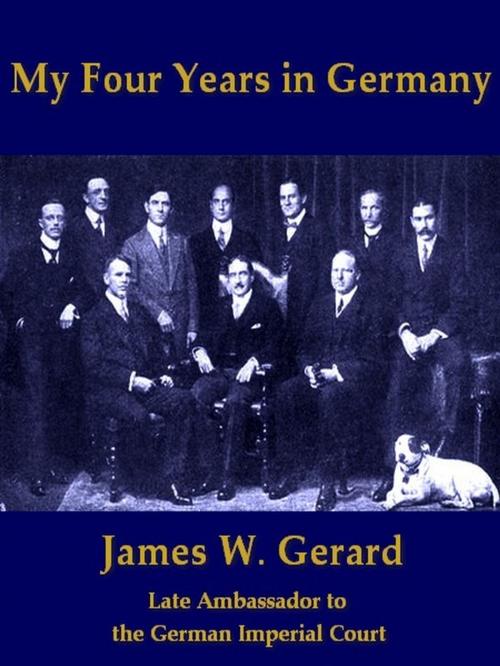My Four Years in Germany
Nonfiction, History, Germany, Americas, United States, 20th Century, Biography & Memoir, Political| Author: | James W. Gerard | ISBN: | 1230000148595 |
| Publisher: | VolumesOfValue | Publication: | July 6, 2013 |
| Imprint: | Language: | English |
| Author: | James W. Gerard |
| ISBN: | 1230000148595 |
| Publisher: | VolumesOfValue |
| Publication: | July 6, 2013 |
| Imprint: | |
| Language: | English |
This edition features illustrations.
FOREWORD
I am writing what should have been the last chapter of this book as a foreword because I want to bring home to our people the gravity of the situation; because I want to tell them that the military and naval power of the German Empire is unbroken; that of the twelve million men whom the Kaiser has called to the colours but one million, five hundred thousand have been killed, five hundred thousand permanently disabled, not more than five hundred thousand are prisoners of war, and about five hundred thousand constitute the number of wounded or those on the sick list of each day, leaving at all times about nine million effectives under arms.
I state these figures because Americans do not grasp either the magnitude or the importance of this war. Perhaps the statement that over five million prisoners of war are held in the various countries will bring home to Americans the enormous mass of men engaged.
There have been no great losses in the German navy, and any losses of ships have been compensated for by the building of new ones. The nine million men, and more, for at least four hundred thousand come of military age in Germany every year, because of their experience in two and a half years of war are better and more efficient soldiers than at the time when they were called to the colours. Their officers know far more of the science of this war and the men themselves now have the skill and bearing of veterans...
About the Author
"James Watson Gerard (1867 – 1951) was a United States lawyer and diplomat. Gerard was born in Geneseo, New York He graduated from Columbia (A.B. 1890; A.M. 1891) and from New York Law School (LL.B. 1892). He was chairman of the Democratic campaign committee of New York County for four years. He served on the National Guard of the State of New York for four years. He served through the Spanish-American War (1898) on the staff of General McCoskry Butt. From 1900 to 1904 he was quartermaster, with the rank of major, of the 1st Brigade of the Guard. He was appointed to the New York Supreme Court in 1908, where he served as a justice until 1911. Under President Woodrow Wilson, he served as the American Ambassador to Germany from 1913 to 1917."--Wikipedia
This edition features illustrations.
FOREWORD
I am writing what should have been the last chapter of this book as a foreword because I want to bring home to our people the gravity of the situation; because I want to tell them that the military and naval power of the German Empire is unbroken; that of the twelve million men whom the Kaiser has called to the colours but one million, five hundred thousand have been killed, five hundred thousand permanently disabled, not more than five hundred thousand are prisoners of war, and about five hundred thousand constitute the number of wounded or those on the sick list of each day, leaving at all times about nine million effectives under arms.
I state these figures because Americans do not grasp either the magnitude or the importance of this war. Perhaps the statement that over five million prisoners of war are held in the various countries will bring home to Americans the enormous mass of men engaged.
There have been no great losses in the German navy, and any losses of ships have been compensated for by the building of new ones. The nine million men, and more, for at least four hundred thousand come of military age in Germany every year, because of their experience in two and a half years of war are better and more efficient soldiers than at the time when they were called to the colours. Their officers know far more of the science of this war and the men themselves now have the skill and bearing of veterans...
About the Author
"James Watson Gerard (1867 – 1951) was a United States lawyer and diplomat. Gerard was born in Geneseo, New York He graduated from Columbia (A.B. 1890; A.M. 1891) and from New York Law School (LL.B. 1892). He was chairman of the Democratic campaign committee of New York County for four years. He served on the National Guard of the State of New York for four years. He served through the Spanish-American War (1898) on the staff of General McCoskry Butt. From 1900 to 1904 he was quartermaster, with the rank of major, of the 1st Brigade of the Guard. He was appointed to the New York Supreme Court in 1908, where he served as a justice until 1911. Under President Woodrow Wilson, he served as the American Ambassador to Germany from 1913 to 1917."--Wikipedia















